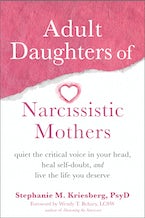By Stephanie M. Kriesberg, PsyD, author of Adult Daughters of Narcissistic Mothers
For years, Linda spent every Christmas Eve at her beloved cousin Cynthia’s house. However, last summer their husbands got into an argument over politics at a backyard barbeque and Cynthia hasn’t spoken to her since. Linda is heartbroken and baffled that such a seemingly minor event has broken their relationship. With Christmas approaching, Linda feels more bereft than ever.
Linda is far from alone, although she feels alone in her anguish. According to Karl Pillemer, author of Fault Lines, more than sixty-five million Americans are estranged from a family member. Even when the relationship has been shaky, people who have been cut off experience feelings of shock, guilt, rage, despair, and shame, among others (Sichel, 2004).
Here are five ways to cope if you or a client are dealing with the impact of family estrangement at the holidays and throughout the year.
1. Accept what is, right now, in this moment, both inside of you and in the world.
That doesn’t mean you like, want, or condone the estrangement or how it makes you feel. It does mean you practice, moment by moment, the reality of the situation. As the famous Swiss psychologist, Carl Jung, wrote, “What you resist persists.”
2. You need skills to practice number one: to accept.
One way is to draw on the wide range of mindfulness tools, often defined as being in the present moment without judgement or criticism. For example, when you’re starting to feel overwhelmed, try this: On your in-breath, repeat the words “I am,” to yourself. On your out-breath, repeat the word “okay” to yourself. Repeat ten times, as often as you need to, substituting any words that feel right to you.
3. Do something new for the holiday, based on what is important to you as a person.
For example, Linda valued sharing a meal with others on Christmas Day, as well as helping others. Linda invited her new neighbors for Christmas breakfast, who just moved from several states away and were still unpacking. Did Linda’s pain disappear? Of course not. But she was able to focus on preparing pancakes mindfully with her senses, noticing the smell as they sizzled, and color of the crisp, brown edges. She focused on doing something that mattered to her.
4. Talk about it with a trusted friend or therapist.
Estrangement is a breeding ground for shame and keeping problems behind closed doors. Opening the door, even just a little, helps you feel less alone and damaged.
5. See if there is something you can learn from what happened.
That doesn’t mean you are to blame and that you should beat yourself up. Perhaps buried in the mess of estrangement you will find some kernel of wisdom about yourself, such as “I will work on being more patient,” that will serve you in the future. That is something you can control, while you cannot control the outcome of the estrangement.
There is no magic potion for the pain of family cutoffs. Consider practicing one of these steps at a time, whichever feels right, and see what happens.
Pillemer, Karl A. (2020). Fault Lines: Fractured Families and How to Mend Them. New York: Avery/Penguin Random House.
Sichel, Mark (2004). Healing from Family Rifts: Ten Steps to Finding Peace After Being Cut off From A Family Member. New York: McGraw-Hill.
Stephanie M. Kriesberg, PsyD, has practiced clinical psychology for twenty-five years. A graduate of the Ferkauf Graduate School of Psychology of Yeshiva University, she is trained in psychodynamic psychotherapy, cognitive behavioral therapy (CBT), and acceptance and commitment therapy (ACT). In addition, she is trained in the practice of clinical hypnosis. Kriesberg is on the board of the New England Society of Clinical Hypnosis.



 2024 Peace Playbook: 3 Tactics to Avoid Clashes with Your Partner
2024 Peace Playbook: 3 Tactics to Avoid Clashes with Your Partner